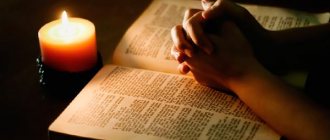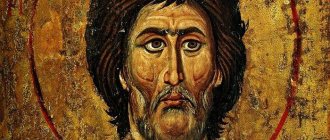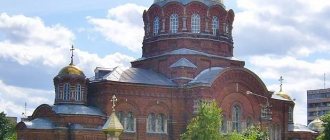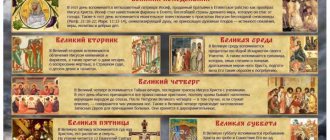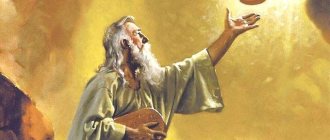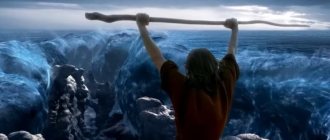| St. Moses Murin |
Moses Murin
(c. 375/c. 400 [1]), hieromonk, venerable Commemorated August 28
He lived a century ago in Egypt. He was an Ethiopian, his face was black and that is why he was called “Murin”. In his youth he was the slave of a noble man, but after he committed a murder, his master drove him away, and he joined a gang of robbers. For his stern disposition and great physical strength, he was chosen as the leader. Moses and his gang committed many atrocities - murders, robberies, so that everyone was afraid even of his name. The robber Moses spent several years in such a sinful life, but by the great mercy of God he repented, left the gang of robbers and went to one of the desert monasteries. Here he cried for a long time, asking to be accepted as one of the brethren. The monks did not believe his sincere repentance, but the former robber still begged not to drive him away until the brethren accepted him. In the monastery, the Monk Moses was in complete obedience to the abbot and the brethren; he shed many tears, mourning his sinful life. After some time, the Monk Moses went to a secluded cell, where he spent a harsh life in prayer and the strictest fasting.
One day, the cell of the Monk Moses was attacked by 4 robbers from his former gang, but he, having not lost his enormous physical strength, tied them all up and, lifting them on his shoulders, brought them to the monastery, asking the elders what to do with the captives. The elders ordered to let them go. The robbers, having learned that they had ended up with their former leader, and he spared them, followed his example, repented and became monks. When the rest of the robbers heard about the repentance of the Monk Moses, they abandoned robbery and became zealous monks.
The Monk Moses was not soon freed from passions. He often came to the abbot of the monastery, Abba Isidore, asking for advice on how to get rid of fornication. The elder, experienced in spiritual warfare, taught him never to be satiated with food, to remain from hand to mouth, observing the strictest abstinence. Passion did not leave the Monk Moses in sleepy visions. Then Abba Isidore taught him all-night vigils. The monk stood all night in prayer, without bending his knees, so as not to fall asleep. From the long struggle, the Monk Moses became despondent, and when he had the thought of leaving the desert cell, Abba Isidore strengthened the spirit of the disciple. He showed him in a vision many demons in the west preparing for battle, and in the east an even greater number of holy Angels also preparing for battle. Abba Isidore reassured the Monk Moses that the power of Angels exceeds the power of demons, and he needed a long struggle with passions in order to be completely cleansed of his previous sins.
The Monk Moses undertook a new feat. Walking around deserted cells at night, he brought each brother water from the well. He especially tried for the elders who lived far from the well and were unable to bring water for themselves. One day, bending over a well, the Monk Moses felt a strong blow to his back and fell dead at the well, lying in this position until dawn. Thus the demons took revenge on the monk for his victory over them. In the morning the brethren brought him to his cell, and he lay in relaxation for a whole year. Having recovered, the monk with firm determination confessed to the abbot that he would continue to strive. But the Lord Himself put an end to this long-term struggle: Abba Isidore blessed the disciple and told him that his fornication had already left him. The elder ordered him to partake of the Holy Mysteries and go in peace to his cell. From then on, the Monk Moses received from the Lord power over demons.
| St. Moses Murin. Icon (XXI century) |
The fame of his exploits spread among the monks and beyond the desert.
The ruler of the country wanted to see the saint. Having learned about this, the Monk Moses decided to hide from the visitors and left his cell. On the way, he met the ruler's servants, who asked him how to get to the cell of the hermit Moses. The monk answered them: “You shouldn’t go to this lying, unworthy monk.” The servants returned to the monastery, where the ruler was waiting for them, and conveyed to him the words of the elder they had met. The brethren, according to the description of the elder’s appearance, unanimously recognized him as the venerable Moses himself. After spending many years in monastic endeavors, the Monk Moses was ordained a deacon. The bishop dressed him in white clothes and said: “Abba Moses is now all white.” The saint answered: “Master, what makes one clean—the external or the internal?” Out of humility, the monk considered himself internally unworthy to accept the rank of deacon. One day the bishop decided to test him and ordered the clergy to drive the deacon out of the altar, cursing him as an unworthy murin. The monk accepted dishonor with complete humility. Having tested him, the bishop ordained the monk a presbyter. In this rank, the Monk Moses labored for 15 years and gathered 75 disciples around him.
When the monk turned 75 years old, he warned his monks that robbers would soon attack the monastery and kill all the inhabitants. The saint blessed the monks to leave in advance to avoid violent death. The disciples began to ask the monk to leave with them, but he answered: “I have been waiting for many years for the time when the word of my Master, the Lord Jesus Christ, will be fulfilled on me, who said: “All who accept the knife will perish by the knife.”
(Matt. 26:52). Then 7 brothers remained with the monk, one of whom, when the robbers approached, hid nearby. The robbers killed the Monk Moses and the six monks who remained with him. Their death followed at the end of the century.
Reverend Moses Murin
Memory 28 August / 10 September
(MP3 file. Duration 8:56 min. Size 6.5 Mb) Read by Hieromonk Ignatius (Shestakov)
Reverend Moses Murin
Blessed Moses was an Ethiopian by origin and had a soul as black as his skin. He was a slave to an official who drove him away for theft and bad deeds. Then he became the leader of robbers who used any means, even murder, to commit theft.
But after one of the incidents, Moses’ conscience awoke. Struck by the love of Christ, he hated sin, as well as his past life, and firmly decided to show ardent repentance. Having received baptism, he immediately retired to the desert of Skete, to a secluded place and devoid of any human consolation: he did not even have a small amount of water to strengthen his body, dried out by the sun and ascetic labors.
One day, four robbers attacked him while he was sitting in his cell. Moses, who was endowed with extraordinary strength, tied them up and, carrying them on his back like a bag of straw, brought them to the church, saying: “I am not allowed to do evil to anyone. What do you order about these people? Having learned that this was Moses, the famous leader of the robbers, four people decided that since such a villain began to serve God, then salvation was not far from them, and they became monks.
Despite repentance and ascetic deeds, Moses continued to be overcome by passionate habits. This second nature was so deeply rooted in him that he had to wage a merciless struggle against the prodigal demon for ten years. One day, already ready to give in to despair and stop fighting, he visited the great Abba Isidore, the Skete priest. When Moses told him about his temptations, the elder replied that one should not be surprised at the cruelty of this battle, because an inveterate sinner is like a butcher’s dog, which is accustomed to gnaw at bones and cannot give up this habit when they stop feeding it and close the butcher shop. Likewise, it is not enough for a sinner to stop committing sin; he needs to drive out a bad habit with the good habit of virtue, mortifying the flesh for many years. The demon, having come to despair at being left without fuel to kindle unclean desires in the heart, will stop fighting.
Returning to his cell, Moses indulged in extremely severe asceticism: he ate only about 340 grams of dry bread a day, exhausted his body with labor, and prayed 50 times a day. But the exhaustion of the body was in vain: it continued to flare up, especially in sleep. Then the ascetic went for advice to another great elder, and he advised adding to the abstinence of the body the abstinence of the mind, purifying it with vigils. From that time on, Moses added vigil throughout the night to fasting: for six years, every night he stood in the middle of his cell in prayer, without closing his eyes. As thoughts continued to besiege him, he completed the creation of a new man within himself with ardent love for his brethren. At night, he went around the cells of elderly hermits who no longer had the strength to fetch water, and filled their jugs from a well, which was located several kilometers away.
The angry demon, seeing that he was defeated on all sides by the servant of God, attacked Moses one night as he bent over the well, and dealt him a strong blow with a club to the lower back. The next day, one brother, coming to draw water, found him there prostrate and half-dead and reported this to Abba Isidore.
Moses was carried to the church, but only after a year had passed did he regain his strength. Isidore urged him to stop calling demons to battle, because there is a measure in everything, but the valiant warrior of Christ replied: “I cannot stop, because I am outraged by the images generated by demons.” The elder announced to the ascetic that from now on he would be freed from dreams and that God had allowed this temptation so that he would not boast that he had overcome passion with his own strength.
Moses returned to his cell. Two months later he visited Isidore again and announced that he no longer felt any anxiety. In addition to the grace of dispassion, God gave him power over demons and turned his unbridled temper into unparalleled mercy and meekness.
One day, a certain brother from Skete committed a crime. The fathers gathered to judge him and invited Abba Moses to join them, but he refused to go to the meeting. Since everyone was waiting for him and it was their custom not to begin meetings until all the ascetics had gathered, the priest sent for Moses. Moses stood up, took the holey basket, filled it with sand, and went to the meeting. The monks who came out to meet him asked: “What is this, father?” The elder replied: “My sins are pouring down behind me, and I do not see them, but I came today to judge the sins of another!” Hearing this, the fathers repented, did not say anything to the guilty brother and forgave him.
One brother came to the Skete to visit the elders, and first of all he wanted to see the famous Abba Arseny, but he did not agree to receive him. After this, he went to Abba Moses, who received him joyfully and kindly. Confused by such a difference in treatment, the brother prayed to God, asking how it happened that one elder avoided people in His name, while the other, for the same reasons, accepted them with open arms. Then he had a vision of two large boats on the river: in one he saw Abba Arseny and the Spirit of God floating on it in peace, and on the other - Abba Moses and the angels of God, who fed him honey pies.
Having acquired great favor from God and becoming a priest, Abba Moses turned the example of his virtues to 70 of his former comrades in robbery, who became his disciples. He taught them to get rid of passions through ascetic labors and staying in a cell, as if they were in the grave, dead to every person. He said: “Sit in your cell, and it will teach you everything” (cf. John 14:26). When they asked him what it meant to die for every person, he answered: “To die for your neighbor means to bear your sins and not care to find out about someone, whether he is good or bad. If we are attentive to our own sins, we will not see the sins of our neighbor. After all, it is madness for a person who has a dead person at home to leave him there and go cry about the death of his neighbor.” When they asked him what all these mortifications of the flesh, which monks necessarily subject themselves to, serve, all these fasts and vigils throughout their lives, he answered: “They make the soul humble. After all, if the soul takes on all this work, God will accept it with compassion.”
Abba Moses was 75 years old when he announced that the Mazik barbarians would soon attack Scete (407). All the monks prepared to flee, except himself. When the brethren asked why he remained so serene, Moses replied: “I have been waiting for this day for so many years, so that the word of our Lord Jesus Christ may be fulfilled: “All who take the sword will perish by the sword” (Matthew 26:52).” Having received instruction from his words, the brethren declared: “We will not run away either, but will remain to die with you.” The elder replied: “It’s none of my business. Let everyone judge his own actions and do according to what the Lord reveals to him.” The barbarians plundered the famous monastic center of Skete, mercilessly killing everyone they found. When they arrived at the cell of Abba Moses and his seven disciples, one of the monks hid behind a pile of ropes. When the barbarians killed the holy fathers, he saw seven crowns descend from heaven and land on their bodies.
From the book “Synaxarion: Lives of the Saints of the Orthodox Church,” published by the Sretensky Monastery Publishing House.
Compiled by Hieromonk Macarius of Simonopetra, adapted Russian translation by Sretensky Monastery Publishing House
I looked at the sky and suddenly gave up everything
We remember this saint not only at every proskomedia, but also at every consecration of bread, every prayer service, everywhere. What particularly attracts us to his personality? Judging by his life, this man most likely grew up in a bandit environment. Probably his parents were also some kind of bandits and lived in a gang, and he literally absorbed with his mother’s milk all the horror of bloodshed, lawlessness, robbery and violence (this is my guess; we don’t find descriptions of his childhood in life). The turning point in his life was one single sigh to the Creator. In the middle of the night, as life describes, he looked at the sky, sighed deeply about God, felt His closeness, and abandoned everything he had lived by before, abandoned his huge invincible gang and went to the walls of the monastery and knelt in front of the entrance.
The monks, seeing Moses, began to prepare for death. The fact is that the figure of Moses was significant in the eastern countries of that time. Moses' gang was the size of a small army. And when he and his gang approached small towns, people preferred to leave everything and leave. Moses himself was an absolutely fearless and fierce warrior. Judging by the descriptions, he was huge, about 2 meters, and very strongly built - a solid mountain of muscles. At the same time, he had fantastic, almost animal-like, reaction and speed. As life says, Moses could deal with several armed men with his bare hands.
How much the Lord loves us, that such a person, living practically in unity with the forces of demons, fused with this evil, can suddenly in one second completely break and become essentially a saint. Not yet in form, he has not yet come close to holiness, but for this one single breath he has already become a different person and can no longer think like bandits or even like laymen, his soul is already calling for solitude and prayer.
This is the turning point we rarely pray for. We are somehow saving ourselves little by little. We did something good, didn’t forget to extend a hand to someone, and that’s it, we seem to be already on the path to salvation. But in fact, this sigh, this cry to the Lord is so important! Until we shout in our souls, “Lord, save me, I’m perishing!” The Lord is not a Savior for us, but just some kind of abstract God. As soon as we cry out, we really do “drown, we perish, save us!” here He rushes to us and extends a helping hand. Apparently this is what happens to the bandit and he becomes a reverend.
At the mercy of demonic temptations
But before rewarding His chosen ones with crowns of glory, the Lord often allows the evil one to subject them to temptations, further tempering the strong and weeding out the weak in spirit. Moses was destined to endure such trials. The enemy of the human race sent to him one of his most insidious servants - the prodigal demon. This wicked man began to confuse the monk’s pure and immaculate thoughts with sinful dreams and kindle his flesh with the hellish fire of lust.
He darkened even those rare hours of sleep that the monk had, sending him instead of pious visions images full of abomination and voluptuousness. The holy saints and faces of angels that once filled his night dreams gave way to lustful and unbridled virgins, inviting the monk with their shameless gestures. To top off his troubles, his sinful flesh completely refused to listen to the voice of reason and clearly indulged the evil demon.
Black robber
History has not preserved the exact date of birth of the future saint, but it is known that he was born in Ethiopia around 330 and, like all his fellow countrymen, had black skin. He was baptized and called Moses. The nickname Murin, with which the monk entered the history of the church, is derived from the word “Moor,” that is, a black inhabitant of North Africa.
As the Holy Scriptures tell, his path to the crown of holiness was long and thorny. Even as a child, deprived of a Christian upbringing, he became mired in vices and gradually sank to the point that in adulthood, while in the service of a worthy gentleman, he committed murder. Having difficulty escaping due punishment, he joined a band of robbers, since with these people he was related by anger and cruelty.
New weapon in the fight against the evil one
Not daring to disturb the peace of Elder Isidore again, St. Moses Murin turned for help to the abbot of the monastery in which he labored all this time. After listening to him, the wise shepherd remembered his youth and his own struggle with the flesh. He recommended that the sufferer, every time an unclean spirit approaches him, torment his nature with backbreaking work, be it in broad daylight or under the cover of night.
From that time on, Moses Murin began to walk around the cells of the brethren every night and, having collected the water-carrying vessels placed near the doors, went with them to the source, which was located at a considerable distance. It was hard work. All night long Moses, bent under the weight of his burden, carried water, while saying prayer.
Victory over the wiles of the devil
This is what the enemy of the human race could no longer endure. Shamed, he retreated forever from the righteous. Leaving in complete powerlessness, the demon stabbed him in the back with a certain tree that came to hand. Unable to obtain the monk's soul, he took out his anger on his flesh, which, moreover, always treacherously indulged in sin.
The life of Saint Moses Murin has preserved for us a description of his last meeting with Elder Isidore. It happened shortly after the holy monk finally got rid of demonic obsessions. Experienced in battles with the spirits of darkness, Father Isidore told him that this misfortune was allowed by God solely so that Moses, having embarked on the path of monastic service, would not become proud of his quick successes and would not imagine himself to be a righteous man, but in everything would rely only on the help of the Almighty.
Storm of the caravan routes
Very soon, Moses Murin took a leading position among the robbers and became their chieftain. The reason for this was his natural strength of character and inflexibility in achieving his goals, which set him apart from the crowd. Under the leadership of Moses, the gang committed many daring robberies, and most of the trading cities in the Nile Delta were marked with traces of their bloody crimes.
The rumor about his “exploits” spread throughout the country, and the merchants, getting ready for the journey, prayed to God to protect their caravan routes from the ruthless robbers and their black chieftain. Sometimes this helped, but more often they disappeared forever in the sultry haze of the deserts, and only the hot wind blew away the bloody bodies abandoned by the road with sand.
Instructions from a wise old man
And the pure soul of the monk would have been lost, plunged into the stinking abyss of sin, but the Lord admonished him to go for advice to a distant monastery, where one of the great pillars of the early Christian church, Presbyter Isidore, labored in the feat of the strictest asceticism. Having listened to everything that Moses Murin, embarrassed, told him, the wise elder calmed him down, explaining that all new monks who have recently entered the monastic path go through similar suffering.
Demons overcome them, sending their ungodly visions, thereby hoping to persuade them to sin. But they are powerless against those who oppose them with prayer and fasting. Therefore, without falling into despondency, one should return to the cell and continue serving God as far as possible, replacing carnal food with spiritual food.
Spiritual insight
For a long time the Lord allowed this lawlessness to happen, but one day He opened Moses’ spiritual eyes, and he saw with horror all the darkness into which he had been plunged by his criminal life. In the blink of an eye, streams of the blood he had shed appeared before him, and his ears were filled with groans and curses of innocent victims. The great sinner fell into the abyss of despair, and only by the grace of God found the strength in himself for further life, firmly deciding to devote the rest of it to repentance and atonement for his sins.
As already mentioned, Moses Murin had extraordinary fortitude and inflexibility, but in his former life these good qualities served low purposes and were turned into evil. Now, overshadowed by the Grace of God, yesterday’s sinner applied them to revive his defiled and desecrated soul.
“We take a step, and the Lord rushes with all his might”
Liturgy in one of the Ethiopian churches.
Photo from thepinsta.com In our community we especially feel the support of several saints: our patron Saint. right John of Kronstadt, Mary of Egypt, patron saint of sobriety St. Boniface, etc. Moses Murin. Because it is these saints who show us, damned sinners, how close the Lord is, and how ready He is to embrace the soul of the repentant. And we feel from their example that a person takes one step towards the Lord, and the Lord rushes with all his might, embraces him, clothes him with His grace and gives him the ring of inheritance.
For modern Christians living in Moscow or New York, what does this life say? The most important thing that it literally shouts about is that the gates to salvation are open to each of the sinners. And you don’t have to be embarrassed, you don’t have to succumb to demonic persuasion to first sin, and then “that’s it, there’s no forgiveness for you, let’s get into a noose and leave this world, anyway, neither Christ nor people will forgive you.” But the life of Moses tells us exactly the opposite! No matter what terrible and insane sins a person has committed, the Lord covers them all with His love, if only the person sincerely repents. The entire life of the Monk Moses, in my opinion, is simply a cry of repentance to heaven.
Everyone has their own path, everyone has their own business. We can save ourselves through small deeds. He took his grandmother across the road, said a few kind words to the homeless man, prayed for him, directed him in the right direction, bought him a bun instead of giving him rubles for a bottle - he had already done a good deed. You just can’t stop, you can’t think that you’ve achieved something.
